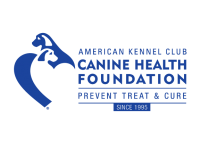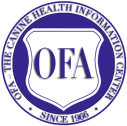
"When 23 and Me Has Gone to the Dogs" - Balancing Challenges and Benefits
 An article in The Canine Chronicle October, 2019, by Caroline Coile, is entitled: When 23 and Me Has Gone to the Dogs.
An article in The Canine Chronicle October, 2019, by Caroline Coile, is entitled: When 23 and Me Has Gone to the Dogs.
It is a summary of some of the discussions and presentations at the 2019 AKC CHF National Parent Club Canine Health Conference. I have already written a blog on my experiences speaking and participating at that meeting: AKC-CHF SYMPOSIUM: Harmonization of Genetic Testing and Breed-Specific Resources, where I cover some of the same ground at Ms. Coile. In that blog, I described the challenges voiced by breed club health committee reps, reflected in the questions they asked during the panel discussions. I said, for example:
"It is not surprising that you are confused and frustrated...the world of genetic testing IS confusing and frustrating!" The worst challenges in communication and understanding have arisen, at least to some extent, by a combination of these factors:
-
A very fast progression from hesitancy to mass acceptance of genetic testing as the ultimate measure of health and disease to inform breeding decisions.
-
Driven by, e.g.:
- The 'Social Phenomena' and marketing of tests Direct-to-Consumer (see my talk at the American Veterinary Association).
- The underlying desire for absolute, straight-forward, black-and-white, simple answers to complex situations.
-
And hampered by, e.g.:
-
Lack of the full, key information for properly integrating genetic testing into best breeding practices. This lack due to, e.g.:
- Overemphasis of research on discovery of new genetic associations compared to study of clinical validity and ultimate utility of genetic tests relative to actual disease occurrence in the populations to which they will be applied.
- Rapid commercialization and offering of tests without anywhere near the level of validation and assessment of quality that is demanded for genetic tests in the human sphere and for virtually all other sorts of tests used in veterinary medicine.
- Inadequate availability of informed genetic counseling - with the genetic counselors challenged by the situations described above.
- Many genetic test providers providing full results on the plethora of tests and trusting consumers to be able to access counseling and/or figure it out themselves.
-
Lack of the full, key information for properly integrating genetic testing into best breeding practices. This lack due to, e.g.:
-
Driven by, e.g.:
An important aspect of this emphasis on genetic testing, mentioned in the Coile article is that, with this rush to genetic testing, there is a tendency to ignore or reduce the emphasis on the big picture of health in a breed, and to sometimes abandon or neglect health strategies and breeding decisions based on them. This I discuss in basically all my talks, e.g., in a presentation to the French Bull Dog Club of America in 2018.
So - challenges, challenges, challenges - for genetic testing from research to application and from validity and quality issues to understanding and communication of best practices for all stakeholders and consumers.
However, let's not 'throw the baby out with the bathwater'. Genetic testing has already supported health and breeding decisions, especially for simple recessive, fully-penetrant conditions. Unfortunately, these are the 'low-hanging fruit' for scientific discovery, and much attention has been paid to them. They are often rare conditions, and although detection and health strategies for them are very important to the limited number of dogs/lines affected, they may not be the most important conditions for the breed. The most common and important conditions, as also stated in the Coile article, are much more complex.
Great things are possible with genetic testing. Whole genome analysis will offer even more potential to help animals and people. However, it looks like genomic testing will also be implemented in spite of great gaps in our understanding of what it means and how to apply it. This video from the human side offers some startling information that should increase our concern (see Strategic Planning Workshop: Genomics in Medicine).

 It is important to also focus on the good work being done to support stakeholders in dog health. Coile mentions the OFA and AKC-CHF is busy with many endeavours (including supporting IPFD). A great example is the Webinar by Joan Coates tomorrow (Thursday 16 October) on the topic of the hour - DM. Dr. Coates' comments at the Parent Club Symposium were important and it is great that they are being expanded to a Webinar. It is expected that she will clarify the DM-testing benefits and challenges, but we cannot kid ourselves that it can rectify the already-entrenched attitudes about DM in specific and genetic testing in general among the public.
It is important to also focus on the good work being done to support stakeholders in dog health. Coile mentions the OFA and AKC-CHF is busy with many endeavours (including supporting IPFD). A great example is the Webinar by Joan Coates tomorrow (Thursday 16 October) on the topic of the hour - DM. Dr. Coates' comments at the Parent Club Symposium were important and it is great that they are being expanded to a Webinar. It is expected that she will clarify the DM-testing benefits and challenges, but we cannot kid ourselves that it can rectify the already-entrenched attitudes about DM in specific and genetic testing in general among the public.
Hope is also offered by the existing and continuing developments by IPFD, on DogWellNet.com, and produced in collaboration of a wide network of international collaborators, although dependent on funding and further support. These include (and see my CHF talk):
- The Harmonization of Genetic Testing for Dogs (HGTD) - catalog on genetic test providers (GTPs) and tests (see the HGTD on DogWellNet.com).
- Initiative to clarify which tests are being offered specifically as targeted, relevant for a breed; collating information on benefits and challenges of panel testing vs. a breed-specific approach.
-
Working Groups from the 4th International Dog Health Workshop (see article on post workshop genetics theme) on:
- A comprehensive matrix of the test discovery-commercialization-application pathway .
- Details on criteria need to provide validation at each step.
- Aspects of laboratory quality and best practices for GTPs.
- The potential for enhanced Proficiency Testing.
- Development of an Expert Panel application to assess and provide collective opinion on key issues about tests and testing.
- The Big Picture: developing the Heath Strategies Database for Dogs (HSDD), that will provide an interactive resource by breed and condition for all diseases/conditions considered important in health strategies from international and local kennel clubs and breed organizations, to include but not be limited those for which a genetic test is available.
- A structure for an Globally Relevant International Health Profile to summarize the state of health for breeds.
Working together, we can improve our ability to make the best decisions for dogs and capitalize on the potential tools and strategies available.


Recommended Comments